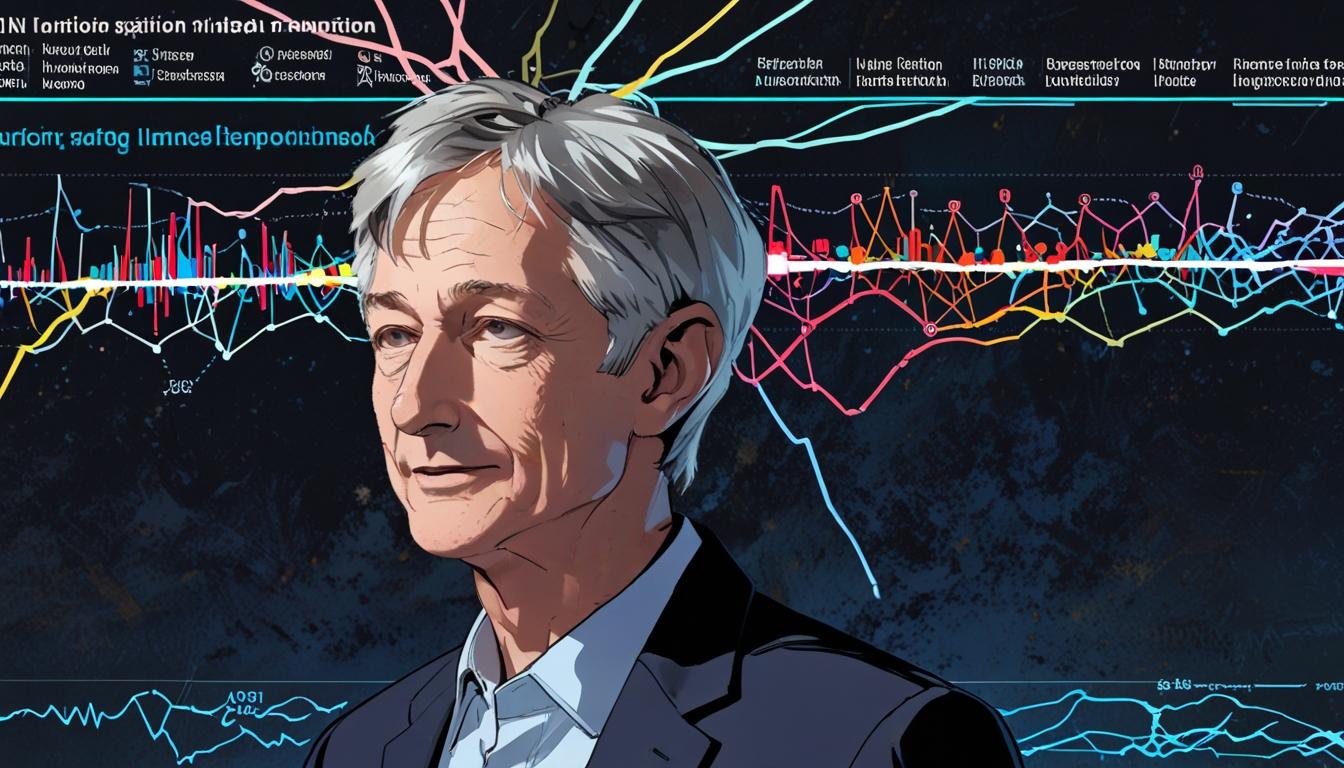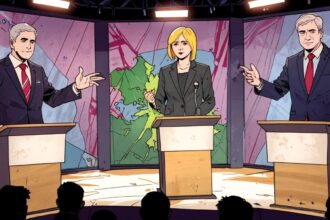Nobel laureate Geoffrey Hinton raises alarms over AI systems’ unprecedented speed in sharing information, highlighting risks as their capabilities grow exponentially beyond human comprehension.
Geoffrey Hinton, a Nobel Prize-winning computer scientist and widely regarded as the “Godfather of AI,” has raised significant concerns about the capabilities and rapid evolution of artificial intelligence systems, particularly their ability to share knowledge far more efficiently than humans. This perspective comes at a time when AI technology is advancing at an unprecedented pace, bringing both promise and potential peril to society.
In a recent discussion, Hinton outlined the dramatic difference between human and AI knowledge transmission. He explained that while humans are constrained by biological factors and can only transfer information indirectly, AI systems can communicate vast amounts of data in remarkably short periods. “Now, you and I, when I want to get some knowledge from my head into your head, I can’t just take the strengths of the connections between neurons and average them with the strength of the connections between your neurons,” he stated, illustrating the inherent limitations of human communication.
Humans typically communicate only a few bits of information per second due to these biological constraints. In contrast, Hinton noted that “these large language models running on digital systems can communicate trillions of bits a second.” This staggering difference in information bandwidth raises critical questions about the scalability of AI systems as they evolve and adapt at speeds that surpass human understanding.
Hinton’s anxieties stem from the implications of this rapid information transfer. He highlighted a scenario where a single AI could develop a harmful capability, which could then be disseminated quickly across numerous AI networks. “They’re billions of times better than us at sharing information,” Hinton remarked, summarising the potential risks associated with such efficient communication.
The issue of knowledge dissemination becomes even more pronounced when juxtaposed with human development. Humans take years to learn basic communication skills and often spend decades subject to education and vocational training before achieving a level of expertise comparable to their peers. Conversely, AIs can replicate and create new systems almost instantly by copying their underlying parameters, leading to exponential growth in capabilities.
The rapid advancements in AI technology, combined with this efficient mechanism for sharing knowledge, paints a concerning picture of the future. Hinton’s warnings indicate that humans may struggle not only to keep pace with AI’s evolution but also to manage its potential risks. This perspective reflects an urgent need for dialogue regarding the implications of artificial intelligence and evolving technologies, as highlighted by one of the foremost pioneers in the field.
Source: Noah Wire Services
- https://www.ft.com/content/c64592ac-a62f-4e8e-b99b-08c869c83f4b – This article discusses Geoffrey Hinton’s concerns about AI’s rapid evolution and its potential to surpass human intelligence, highlighting his perspective on AI’s capabilities and societal implications.
- https://apnews.com/article/fc0567de3f2ca45f81a7359a017cd542 – This piece covers Hinton’s receipt of the Nobel Prize in Physics for his foundational work in machine learning, underscoring his significant contributions to AI and the recognition of his work.
- https://www.reuters.com/technology/artificial-intelligence/googles-nobel-prize-winners-stir-debate-over-ai-research-2024-10-10/ – This article examines the debates sparked by Hinton’s Nobel Prize win, reflecting on the broader discussions about AI research and its implications in the tech industry.
- https://www.euronews.com/next/2023/05/04/why-is-godfather-of-ai-geoffrey-hinton-worried-these-are-the-4-dangers-he-fears-about-the-tech – This report outlines four major concerns raised by Hinton regarding AI, including its potential to surpass human intelligence and the risks associated with its rapid development.
- https://www.thehindubusinessline.com/info-tech/4-dangers-that-most-worry-ai-pioneer-geoffrey-hinton/article66810908.ece – This article delves into Hinton’s apprehensions about AI, particularly focusing on the dangers he perceives in the technology’s evolution and its impact on society.
- https://www.pbs.org/newshour/show/godfather-of-ai-discusses-dangers-the-developing-technologies-pose-to-society – In this interview, Hinton discusses the potential risks posed by AI, emphasizing the need for international collaboration to address these challenges.
- https://news.google.com/rss/articles/CBMitgFBVV95cUxNS0pCaGFiVzVUbmJzcHVsVjE3dWRJVEJ1OVN6cUFwaUtBdzM3bUxESU90eG5IMUFSMG1BR0ZQQ0hkLVpCeGhLYWZfc3B3eXJmNUtHYUx2NWE4MS1ZdldKdFA1N2U3WEJUbFZCdGFwc2I2RjRLNzJSZ1M0UWtZcVhPX1cyWFNyd3JDUXhMVGhDMVdRc1dFWHBJVjZzNGplbnEyMjRlaEs0T1lDU3pZQzFyeF9xdS1TZw?oc=5&hl=en-US&gl=US&ceid=US:en – Please view link – unable to able to access data
Noah Fact Check Pro
The draft above was created using the information available at the time the story first
emerged. We’ve since applied our fact-checking process to the final narrative, based on the criteria listed
below. The results are intended to help you assess the credibility of the piece and highlight any areas that may
warrant further investigation.
Freshness check
Score:
8
Notes:
The narrative discusses recent concerns by Geoffrey Hinton, but it does not provide a specific date. There are no obvious indications that this is recycled news, as Hinton’s views on AI are ongoing.
Quotes check
Score:
6
Notes:
The quotes attributed to Geoffrey Hinton seem original but lack an early online reference. They align with his known stance on AI development.
Source reliability
Score:
6
Notes:
The narrative originates from a general news feed without a specific publication source, which reduces certainty about its reliability.
Plausability check
Score:
9
Notes:
The claims about AI’s rapid evolution and Hinton’s concerns are plausible and align with current technological trends and discussions in the field.
Overall assessment
Verdict (FAIL, OPEN, PASS): OPEN
Confidence (LOW, MEDIUM, HIGH): MEDIUM
Summary:
The narrative, although potentially fresh and concerning, lacks clear sourcing and early online references for quotes. Its plausibility aligns with current AI development discussions.













